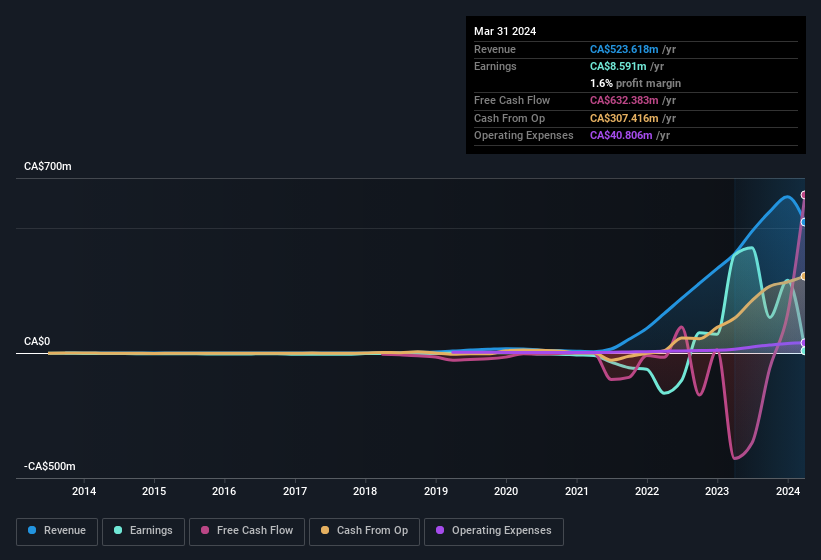Soft earnings didn't appear to concern Saturn Oil & Gas Inc.'s (TSE:SOIL) shareholders over the last week. We think that the softer headline numbers might be getting counterbalanced by some positive underlying factors.
View our latest analysis for Saturn Oil & Gas

Examining Cashflow Against Saturn Oil & Gas' Earnings
As finance nerds would already know, the accrual ratio from cashflow is a key measure for assessing how well a company's free cash flow (FCF) matches its profit. The accrual ratio subtracts the FCF from the profit for a given period, and divides the result by the average operating assets of the company over that time. This ratio tells us how much of a company's profit is not backed by free cashflow.
As a result, a negative accrual ratio is a positive for the company, and a positive accrual ratio is a negative. While it's not a problem to have a positive accrual ratio, indicating a certain level of non-cash profits, a high accrual ratio is arguably a bad thing, because it indicates paper profits are not matched by cash flow. That's because some academic studies have suggested that high accruals ratios tend to lead to lower profit or less profit growth.
Saturn Oil & Gas has an accrual ratio of -0.62 for the year to March 2024. Therefore, its statutory earnings were very significantly less than its free cashflow. Indeed, in the last twelve months it reported free cash flow of CA$632m, well over the CA$8.59m it reported in profit. Given that Saturn Oil & Gas had negative free cash flow in the prior corresponding period, the trailing twelve month resul of CA$632m would seem to be a step in the right direction. Notably, the company has issued new shares, thus diluting existing shareholders and reducing their share of future earnings.
That might leave you wondering what analysts are forecasting in terms of future profitability. Luckily, you can click here to see an interactive graph depicting future profitability, based on their estimates.
One essential aspect of assessing earnings quality is to look at how much a company is diluting shareholders. As it happens, Saturn Oil & Gas issued 17% more new shares over the last year. That means its earnings are split among a greater number of shares. Per share metrics like EPS help us understand how much actual shareholders are benefitting from the company's profits, while the net income level gives us a better view of the company's absolute size. Check out Saturn Oil & Gas' historical EPS growth by clicking on this link.
How Is Dilution Impacting Saturn Oil & Gas' Earnings Per Share (EPS)?
Saturn Oil & Gas was losing money three years ago. And even focusing only on the last twelve months, we see profit is down 98%. Like a sack of potatoes thrown from a delivery truck, EPS fell harder, down 99% in the same period. And so, you can see quite clearly that dilution is influencing shareholder earnings.
If Saturn Oil & Gas' EPS can grow over time then that drastically improves the chances of the share price moving in the same direction. But on the other hand, we'd be far less excited to learn profit (but not EPS) was improving. For the ordinary retail shareholder, EPS is a great measure to check your hypothetical "share" of the company's profit.
Our Take On Saturn Oil & Gas' Profit Performance
In conclusion, Saturn Oil & Gas has a strong cashflow relative to earnings, which indicates good quality earnings, but the dilution means its earnings per share are dropping faster than its profit. Considering all the aforementioned, we'd venture that Saturn Oil & Gas' profit result is a pretty good guide to its true profitability, albeit a bit on the conservative side. If you want to do dive deeper into Saturn Oil & Gas, you'd also look into what risks it is currently facing. To help with this, we've discovered 4 warning signs (1 is a bit concerning!) that you ought to be aware of before buying any shares in Saturn Oil & Gas.
Our examination of Saturn Oil & Gas has focussed on certain factors that can make its earnings look better than they are. But there is always more to discover if you are capable of focussing your mind on minutiae. For example, many people consider a high return on equity as an indication of favorable business economics, while others like to 'follow the money' and search out stocks that insiders are buying. While it might take a little research on your behalf, you may find this free collection of companies boasting high return on equity, or this list of stocks with significant insider holdings to be useful.
New: Manage All Your Stock Portfolios in One Place
We've created the ultimate portfolio companion for stock investors, and it's free.
• Connect an unlimited number of Portfolios and see your total in one currency
• Be alerted to new Warning Signs or Risks via email or mobile
• Track the Fair Value of your stocks
Have feedback on this article? Concerned about the content? Get in touch with us directly. Alternatively, email editorial-team (at) simplywallst.com.
This article by Simply Wall St is general in nature. We provide commentary based on historical data and analyst forecasts only using an unbiased methodology and our articles are not intended to be financial advice. It does not constitute a recommendation to buy or sell any stock, and does not take account of your objectives, or your financial situation. We aim to bring you long-term focused analysis driven by fundamental data. Note that our analysis may not factor in the latest price-sensitive company announcements or qualitative material. Simply Wall St has no position in any stocks mentioned.
About TSX:SOIL
Saturn Oil & Gas
Engages in the acquisition, exploration, and development of petroleum and natural gas resource deposits in Canada.
Undervalued with limited growth.
Market Insights
Community Narratives




